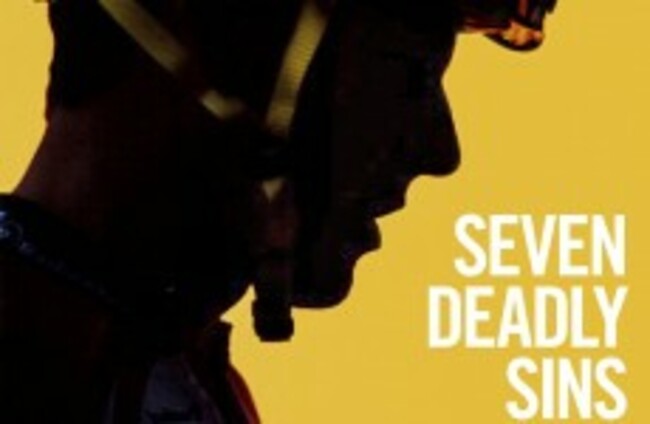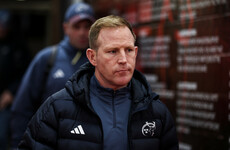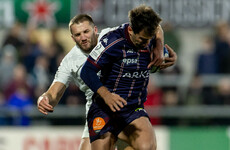THE NEWS THAT Lance Armstrong would not be contesting the doping allegations, made by the United States Anti-Doping Agency against him, was announced in August.
It marked the end of a 13 year pursuit waged by sports journalists David Walsh, Pierre Ballester and Paul Kimmage.
Walsh spoke to Newstalk in advance of the release of his new book on Armstrong and the blood-doping scandal that continues to dog the world of professional cycling.
The Sunday Times journalist has described his journey from a cycling fan with a press pass to one of a small cadre of writers that was determined to expose the inherent flaws in cycling.
Walsh’s pursuit of Armstrong, who won seven Tour de France titles only to have them later stripped from him, began six years after their first one-on-one interview in 1993.
‘This kid is going to be somebody’
Armstrong was 21-years-old when he sat down with Walsh for the first time.
The author explained that the Texan had developed a reputation as a promising young cyclist with the potential to be the best of his generation.
During the interview, Armstrong spoke about his drive and determination. Armstrong declared, according to Walsh, that he had ‘heart, soul and I’ve got guts. I’m not going to be denied’.
That evening, Walsh met up with Kimmage and tour photographer Billy Stickland for dinner and told them ‘this kid is going to be somebody’.
Walsh came across Armstrong, who was making his comeback after successful cancer treatment, again before the Tour de France, dubbed as The Renewal Tour after a raft of doping scandals earlier in the decade.
“I was ready to behave as a proper journalist in 1999,” said Walsh.
“I say that because when I started in the 80′s I was more of a fan with a typewriter.”
Armstrong stormed to the Tour de France that summer, setting record times and winning four stages along the way.
“I had a bad sense against Armstrong from the first day of that tour,” said Walsh.
Confrontation
Walsh raised his concerns during and after the tour but, he said, when doping questions were put to Armstrong, his attitude conveyed that performance enhancement was a problem of the past and in no way connected to him. He added:
I just thought, ‘Mate, hold on here. Do you take us for idiots?’
Walsh pointed out that, to him, it was ‘blindingly obvious’ that Armstrong was a drugs cheat. That view was not shared by all in the sport.
He commented, “You had people in the sport who were always complicit in the cover-up… they were bullying people into silence.” He added:
“They saw this American cancer survivor as the perfect vehicle to respectability.”
Armstrong in action at Le Tour in 1999. (©INPHO/Allsport)
A second meeting
The Millennium came and went. As Armstrong continued to dominate the sport, Walsh and his fellow believers kept up the chase for justice.
Walsh’s 1999 New Year’s resolution, written in his newspaper column, to bring evidence ‘against the greatest drug cheat in cycling’ earned him a personal call from the American.
It took a year to arrange a second sit-down with Armstrong and, on this occasion, a lawyer [Bill Stapleton] for the cyclist was present. Walsh did not beat around the bush.
Bill put down his tape recorder, I put down my tape recorder, look across the table and say ‘Look Lance, I don’t believe you’re clean’.”
He added, “The only subject on my agenda is doping. I have to try and establish whether you’re the champion we can applaud, that we can acclaim. Because, at this point, I don’t believe you are.
“[Lance] said that’s fine and we talked about doping but his answers, they were ridiculous.”
Brick wall
Armstrong’s defence at the time – and it remains so to this day – revolves around the fact that he never tested positive for blood doping.
In Walsh’s co-authored L.A Confidentiel book, published in 2004, he included statements from ex-teammates, rivals, doping experts and former masseuse Emma O’Reilly to debunk Armstrong’s whiter-than-white assertions.
The book was a commercial and critical success but it failed to elicit any official reviews from the International Cycling Union, sponsors or tour organisers. Walsh brought out a second book, From Lance to Landis, a year later.
He revealed that Armstrong labelled him a troll and often referred to him as ‘the little idiot’. Walsh added:
It was slightly reassuring because if I wasn’t getting somewhere it would not have bothered him.”
USADA’s report, released in October, stating that Armstrong’s US Postal Service team had ‘groomed and pressured athletes to use dangerous drugs’ was vindication for Walsh and the others that crusaded against the seven-time champ.
He remains unhappy, however, that UCI president Pat McQuaid ‘had his chance to show his colours in the last seven years’ but failed to retrospectively pursue Armstrong and other drugs cheats.
The fight goes on
With Armstrong choosing not to fight the stripping of his Le Tour and Olympic baubles, Walsh feels he may be return to return to the tour as a beat journalist.
His investigative and querying mind has not wilted in the 13 years that he became obsessed with exposing Armstrong and his cohorts.
He revealed, “A lot of people think Team Sky are clean. I think they may be but I have to make sure.”
Walsh also noted his displeasure at the close relationship many journalists have with current Le Tour champion Bradley Wiggins.
“Too many journalists are calling Bradley Wiggins ‘Wiggo’.
“We’re not in this business to make friends with the champions.”
You can listen to the full interview here >>














Full confidence in the team to perform very well for the rest of the tournament!
@Jasper Conroy: Really???
2007 comparisons are lazy. We hammered Scotland in our first match. People seem to have completely forgotten that.
11 points from a possible 15 after 3 games. Not a bad return at all. Time to get behind the team and stop the moaning. #COYBIG
Some load of negative tosspots in the media. Same goons who downplayed the grand slams, dismissed wins over NZ/SA and cheered for Racing over Leinster are now delighted. It’s like they are in competition to be the new Tom Humphries.
The social media campaigns from the sponsors are grating, but they always are no matter the sport or team.
It never ceases to amaze me how the commentators/pundits swing, we beat a poor Scotland and we are set for a quater final against SA no account taken of Japan who should be tier one nation and who accounted for SA in 2015, who are also hosting. We then put 35 points on Russia get the bonus point and Eddie is not satisfied, the same Eddie who presided over the debacle of 2007 in FRANCE. Give this squad a break and get behind then nothing is to be gained from negativity. Bestie and the Boys Abú
Just 22 points and one try conceded in 3 games is a very healthy stat .
@Limón Madrugada:
“Just 22 points and one try conceded in 3 games”
And we scored 11 tries to 1 conceded :: if we stated that before the WC we would have been happy :: but in that, there was 1 loss !!!!!!
Yeah the negativity is getting to me also. Can we do a bit of analysis on the positives? Also aside from Samoa game we probably won’t go into another game as favourites no matter how far we go in the tournament and that is just fine by me. That’s where the Irish pysche is more comfortable and more dangerous. I hope we play well against Samoa and get the result needed to put pressure on Japan and then we put the fear of God into our opponents in the quarters!
@Brian O’Driscoll: have to agree, finally watched the Russia game. There was a lot of good variation in attack which ended with a poor handling error or a Russian infringement (often not penalised – for Henderson’s knock on over the line, it was actually good Russian D but the 7 knocked on in the preceding ruck). The evidence is there that Ireland are about to kick on. Everyone would take a loss in the group if it meant peaking at QF stage and you can see Ireland are starting to ramp it up.
Hugh Cahill’s and Donal Lenihan’s rugby commentary is also very poor and schizophrenic. The keyboard warriors and Ed O Sullivan’s of this world will be the biggest fans when we put Samoa to the sword by at least 30 points. COYBIG
@Brian O’Driscoll:
@Brian O’Driscoll: have to agree. I finally watched the Russia game and the evidence is there that they are beginning to vary their attacking play which often ended with an error or Russian infringement. They played good ball. Russia was not the game to correct the Japan loss. What good would it be to go out and put 70 on Russia. It’s better they tried to evolve the game. No one wants 4 pool wins if it means a QF loss. I can see Ireland ramping up their game plan ahead of a QF showdown and surprised others who are professionals in the game don’t see it.
People like Ed O Sullivan and the keyboard warriors who think the Russian game was the game to correct the woes of the Japan loss are fools. The time to do it is at the QF.
We’ll put 30 on Samoa.
I’m sick to the back teeth of all the negativity. The final straw for me was Sean Farrell on the42′s rugby podcast yesterday moaning that Ireland’s first try against Russia was an old Joe Schmidt strike move. Some people will always find something negative to say.
Completely down to the players themselves, their mind set, body language, which to date hasn’t been great.
They’ve done it before so they can up it again.
Ah Martin you should know more than anyone that negativity does nothing for any teak.
Team that is